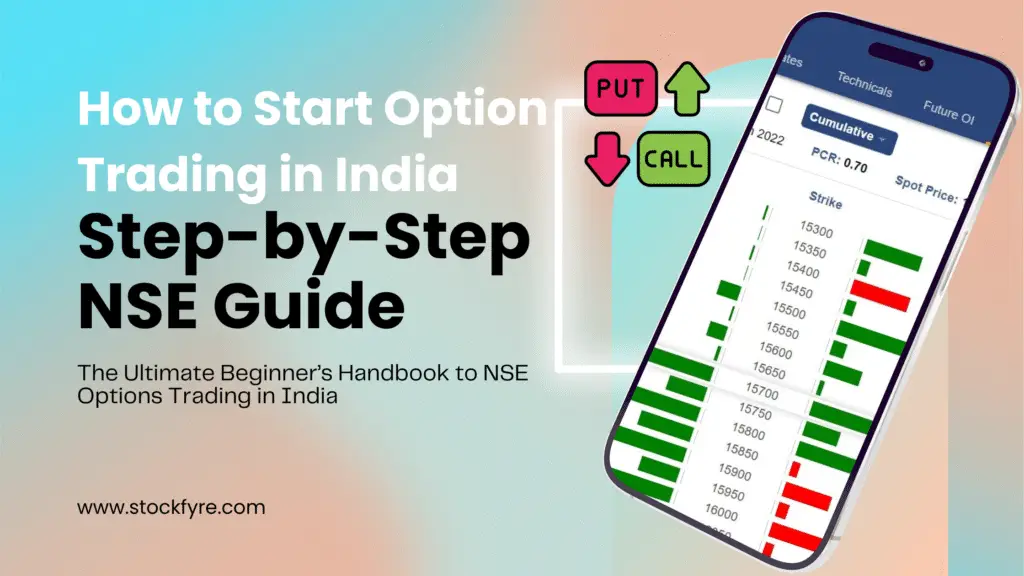How to Start Option Trading in India: Step-by-Step NSE Guide
Learn Options Trading Like a Pro – From Basics to Breakthroughs!
Introduction: Why Options Trading is the New-Age Wealth Strategy
Are you fascinated by the buzz around option trading in India but unsure how to begin? Whether you’re a curious beginner or an experienced trader looking to expand your skills, options trading offers massive opportunities—if done right. With the National Stock Exchange (NSE) providing a reliable platform and the Indian derivatives market booming, now is the perfect time to dive in.
At Stockfyre Academy, we specialize in simplifying the complex world of stock markets. This blog offers a complete step-by-step NSE guide on how to start option trading in India, helping you trade smartly, minimize risks, and maximize returns.
What is Option Trading? A Quick Refresher
Option trading is a type of derivatives trading where the trader buys or sells the right (not obligation) to buy/sell an asset at a specific price before a specified date.
There are two types of options:
- Call Option – Right to buy
- Put Option – Right to sell
These instruments are powerful tools for hedging, speculation, and income generation.
Step-by-Step Guide to Start Option Trading in India (NSE-Based)
✅ Step 1: Understand the Basics of Derivatives
Before placing your first trade, build a strong foundation:
- Learn what strike price, expiry date, lot size, and premium mean.
- Know the difference between ITM, ATM, and OTM options.
Pro Tip: Stockfyre Academy’s beginner course in derivatives covers all these in-depth.
✅ Step 2: Open a Trading and Demat Account
You need to open an account with a SEBI-registered stockbroker who offers NSE F&O trading access.
Checklist:
- PAN card & Aadhaar
- Bank details
- Income proof (mandatory for F&O)
- Mobile number linked with Aadhaar
Top brokers: Zerodha, Angel One, Upstox, ICICI Direct
✅ Step 3: Activate F&O Segment
Once your account is open, request activation for Futures & Options (F&O) trading. Submit income proof such as:
- Salary slips
- ITR
- Bank statements
Once verified, you’re F&O-ready!
✅ Step 4: Use NSE Option Chain Data
Head to the NSE Option Chain. It provides real-time data on:
- Strike prices
- Open interest
- Bid/Ask prices
- Volume
Learn to interpret OI buildup for identifying support, resistance, and trend direction.
✅ Step 5: Learn Strategies Before You Trade
Option trading isn’t gambling—you need a plan. Start with basic strategies like:
- Covered Call
- Protective Put
- Straddle
- Iron Condor
Understand risk-reward and volatility impact before you enter.
Join Stockfyre’s Advanced Options Strategy Masterclass for hands-on learning!
✅ Step 6: Practice on Virtual Platforms
Use paper trading tools like:
- Sensibull
- Opstra
- NSE Paathshala
Test your strategies before you commit real money.
✅ Step 7: Begin Live Trading with Small Lots
Start with Index Options (Nifty/Bank Nifty)—they offer high liquidity. Begin with small lot sizes, maintain a risk-reward ratio, and always use stop-loss.
✅ Step 8: Learn from Professionals
Learning never stops. Attend webinars, join live mentorships, and analyze the market daily.
At Stockfyre Academy, our expert trainers help decode real-time market moves every week!
Why Learn Options Trading with Stockfyre Academy?
- NSE & NISM Certified Trainers
- Hands-On Trading Labs
- Live Market Classes
- Community of Traders & Mentors
- 100% Practical Learning Model
💬 “I went from random trades to consistent profits in 3 months—all thanks to Stockfyre’s Option Mastery Course!” — Rakesh Sinha, Student
FAQs: Option Trading in India
- Is option trading legal in India?
Yes, it’s fully legal and regulated by SEBI on platforms like NSE and BSE.
- How much capital do I need to start option trading?
You can start with as low as ₹5,000–₹10,000. Index options are ideal for beginners.
- Is option trading safe for beginners?
With proper education, risk management, and discipline—it’s safe and profitable.
- Do I need income proof for trading options?
Yes, brokers require income proof to activate your F&O segment as per SEBI guidelines.
- Can I trade options without a NISM certification?
Yes, but certification like NISM Series VIII gives you a huge edge in understanding compliance, risk, and strategy.
Conclusion: Take Your First Step Toward Option Trading Success
The world of options trading is rich with opportunity—but success comes only with the right knowledge and mindset. Don’t rely on tips and guesswork. Learn the strategies, understand the risks, and trade with confidence.
- Ready to transform your trading journey?
Ready to Build Real Wealth Through the Stock Market?
Join Stockfyre Academy — India’s Trusted Stock Market Training Institute
Online + Offline Classes | NISM & NSE-Certified Trainers
- From Basics to Advanced Trading Strategies
- Live Market Training | 1-Year Mentorship
- Learn Smart. Trade Confident. Grow Wealthy.

Sushil Chauhan is the Founder & Mentor at Stockfyre Academy, a NISM-Certified Research Analyst and NSE Certified Trainer. He has also worked with prominent stock broking firms such as Angel One and ICICI Direct Ltd. With strong practical market experience, he has guided thousands of traders and investors across India through structured, education-first stock market learning focused on real market understanding and discipline.


